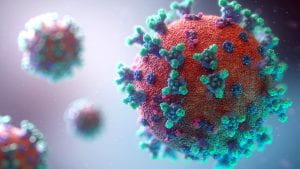 The internet if full of memes about gaining weight during the COVID-19 pandemic. It’s no surprise; being stuck at home without normal activities and constant access to food can easily lead to overeating. On top of boredom and proximity to food, the worries and stress that accompany a global pandemic can easily lead to emotional eating. [Read more…]
The internet if full of memes about gaining weight during the COVID-19 pandemic. It’s no surprise; being stuck at home without normal activities and constant access to food can easily lead to overeating. On top of boredom and proximity to food, the worries and stress that accompany a global pandemic can easily lead to emotional eating. [Read more…]
What We Know About Emotional Eating
How Not to Get COVID-19: What We Know and What We Don’t
 As states across America begin to reopen after months of closures due to the coronavirus pandemic, people must make individual decisions about how much exposure they have to other people. Meanwhile, scientists across the globe are racing to learn as much as they can about how COVID-19 spreads and the best ways to keep people from contracting the disease. [Read more…]
As states across America begin to reopen after months of closures due to the coronavirus pandemic, people must make individual decisions about how much exposure they have to other people. Meanwhile, scientists across the globe are racing to learn as much as they can about how COVID-19 spreads and the best ways to keep people from contracting the disease. [Read more…]
The Evidence on Face Masks
 Since the U.S. Centers for Disease Control recommended that Americans wear face masks when they go out in public, it’s likely that you are noticing a variety of face coverings – bandanas, homemade fabric masks, medical-grade masks and more – when you venture out. [Read more…]
Since the U.S. Centers for Disease Control recommended that Americans wear face masks when they go out in public, it’s likely that you are noticing a variety of face coverings – bandanas, homemade fabric masks, medical-grade masks and more – when you venture out. [Read more…]
The Evidence on Loneliness and What To Do About It
As governments tell huge numbers of Americans to stay home to stop the spread of coronavirus, it’s natural for some people to experience feelings of loneliness – especially those who live alone and may go for days without seeing another human in person. [Read more…]
Understanding the Science of Hand Hygiene
 By now, you’ve certainly heard about the coronavirus epidemic that began in China and is now spreading across the globe. Most people who contract the virus will come down with mild, flu-like symptoms including fever, fatigue, dry cough and shortness of breath. But the virus can be life-threatening for older adults or people with poor health. [Read more…]
By now, you’ve certainly heard about the coronavirus epidemic that began in China and is now spreading across the globe. Most people who contract the virus will come down with mild, flu-like symptoms including fever, fatigue, dry cough and shortness of breath. But the virus can be life-threatening for older adults or people with poor health. [Read more…]
Researchers Identify Unwarranted Medical Care Among Kids
Of course parents want their children to receive the most comprehensive, up-to-date and highest-quality medical care available. But medical researchers are finding that in a rush to adopt new medical practices and safeguard children’s health, providers may sometimes do more harm than good. [Read more…]
Looking On The Bright Side Can Help You Live Longer
 We all like to be around optimistic people, those who feel hopeful and confident about the future, and embody a positive mental attitude.
We all like to be around optimistic people, those who feel hopeful and confident about the future, and embody a positive mental attitude.
Now a growing body of research demonstrates that those “glass-is-half-full” types are not just more pleasant to be around – they are more likely to live longer, healthier lives. [Read more…]
Clear Evidence: What You Eat Affects Your Mental Health
If there’s one concept health researchers have come to agree on it’s this: What you eat matters. Although they don’t always agree on what constitutes a healthy diet, medical experts have long understood that while certain foods can help to improve your physical well-being, others have the opposite effect. [Read more…]
The Latest Evidence on Autism Diagnoses and Treatment
The medical conditions we now call “autism spectrum disorders” were first identified and labeled in the late 1930s. This group of disorders result in communication difficulties, repetitive behaviors, sensory issues, and problems with social interaction. The medical community’s understanding of these disorders and the best ways to treat them is constantly evolving. [Read more…]
The Evidence on Giving Thanks
Millions of people will gather with family and friends this week to celebrate what may be one of the most quintessential American holidays – Thanksgiving.
As its name implies, Thanksgiving is all about giving thanks – or showing appreciation or gratitude. It turns out there is a significant body of scientific literature demonstrating that thankfulness. [Read more…]








